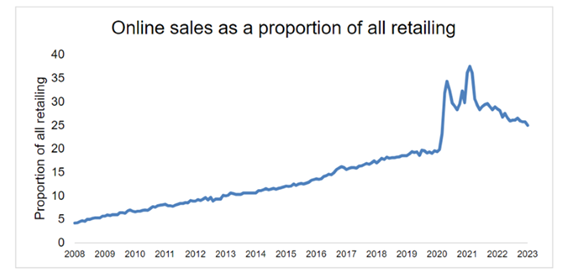Introduction
After much debate, the Digital Markets, Competition and Consumers Act 2024 (DMCCA) has now become law. The DMCCA provides more protection for consumers in the UK as well as giving the UK competition regulator enhanced power in respect of both consumer rights and also in relation to technology companies with “strategic power”. In particular, the DMCCA gives consumers greater control and clarity over online purchases.
In this newsletter we will look at the key consumer law changes that will be subject to the DMCCA.
Why do consumers need more protection in the online marketplace?
The Office for National Statistics have indicated that online sales are a significant section of all sales in the UK. The graph below shows the growth in online sales, which is over 20% of all sales. There was an understandable spike in the amount of online sales over the COVID-19 lockdown periods, but the amount of online sales, and related disputes, remains significant.

What online practices does the DMCCA focus on?
Subscription traps These are practices that make it easy to sign up to a subscription but hard to cancel it. Examples include auto-renewals, free trials that convert into paid for subscriptions and exit fees on cancellation.
The DMCCA now provides for:
- Reminder - a reminder notice must be sent to customers to inform them that the free trial, discounted offer, or first and subsequent renewal payment is ending and to inform them of their rights to terminate or renew.
- Cooling-Off Period - not only can first-time online subscribers enjoy a cooling-off period, but this period also applies to each renewal of the contract. Any cancellation during the cooling-off period should result in a refund by the business.
- Cancellation Rights - although businesses can offer guidance on cancellation, no restrictive termination conditions may be enforced. Customers are entitled to terminate the contract by sending a ‘clear statement’ despite not following the specific route provided by the business.
Drip pricing and hidden fees Drip pricing occurs when extra costs are revealed later in the booking process instead of showing the ‘total price’ at the beginning.
Fake Reviews The DMCCA adds fake reviews to the list of prohibited commercial practices. Fake reviews include submitting or commissioning fake reviews, as well as publishing reviews without taking reasonable and proportionate steps to check they are genuine. It also includes consumer reviews written or submitted by a person who has been commissioned or incentivized to do so.
What sanctions are imposed to deal with breaches of these consumer protections?
The DMCCA sets out a range of fines for non-compliance with consumer laws. These represent a significant new risk for businesses, with the fines for consumer law breaches in some cases reaching as high as those for competition law infringements.
For breaching consumer laws, businesses and their accessories may be fined up to 10% of global annual turnover (or £300,000 if higher). There are also fines for non-compliance with information requests, and for failure to comply with a direction imposed by the Regulator.
Does the DMCCA cover anything else?
Yes, the DMCCA deals with a number of other issues including:
- giving the Regulator greater powers to impose penalties, issue directions and take over some of the powers previously vested in the courts
- enabling the Regulator to designate certain technology companies as having strategic market status (SMS); these companies will need to have a position of strategic significance and a global turnover exceeding £25 billion or a UK turnover exceeding £1 billion. Once designated by the Regulator, such a company may then be subject to an investigation by the Regulator into its digital activities.
Are the DMCCA provisions now active?
The DMCCA was passed on May 23, 2024. However, its provisions have not yet come into force but are expected to do so later this year.
What can businesses do?
The SMS rules are likely to affect only a few companies. However, the rules relating to online contracts with consumers are likely to affect may businesses in one form or another. You should review not only your terms and conditions, but also your business practices (such as notifying customers of opt-out rights on renewal) in light of the new consumer protection rules.
How 3CS can help
Our team of corporate and commercial lawyers and consultants have both domestic and international expertise and offer a full range of corporate and commercial legal services. If you need any assistance or have any other questions in relation to compliance with data protection requirements, please get in touch with your usual 3CS contact.


















